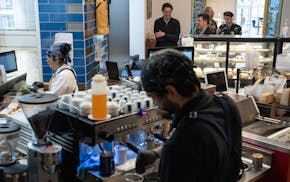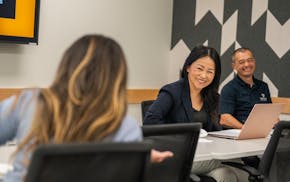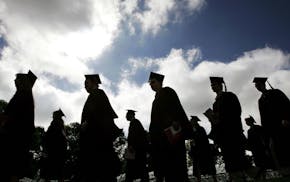While experiencing weightlessness in space, astronauts can float in no particular direction. The same goes for other objects aboard spacecrafts, including liquids.
For space travelers in need of eye drop medication, it's not an ideal situation. If squeezed out too slowly from the dropper, the liquid can form a large ball of fluid. Droplets can grow to up to six times their normal size, overmedicating the eyes.
To avoid this problem, NASA enlisted the help of a Minnesota startup.
Rochester-based Nanodropper, the maker of an eye drop adapter that reduces the size of eye drops by 60%, is providing its products as part of an experiment for astronauts aboard the International Space Station, a multi-nation laboratory orbiting about 250 miles above the earth's surface. The adapters will be stored aboard the upcoming SpaceX Crew-8 mission rocket launching Friday carrying Americans Matthew Dominick, Michael Barratt and Jeanette Epps and Russian mission specialist Alexander Grebenkin.
The four will join other crew members aboard the station, where they will conduct experiments and research activities designed to prepare the human body for further space exploration. They will use the Nanodropper on eye drop bottles to preserve medication resources, the company said.
"The prospect of supporting our astronauts and their eye health on future missions is surreal to consider," said Allisa Song, the chief executive of Nanodropper.
Song started the company in 2017 while working as a researcher and lab manager at the University of Washington in Seattle after learning drug companies were purposefully making eye drops too big, forcing consumers to constantly restock. The human eye can only absorb between seven to 10 microliters of fluid, though companies were selling medications with droppers that dispensed between 35 and 70 microliters, she said.
The company moved its headquarters from Seattle to Rochester following Song's enrollment at the Mayo Clinic Alix School of Medicine.
Nanodropper won the Minnesota Cup, the state's largest innovation competition, in 2021, and with it, $75,000 in prize money. The company sells its adapters through 2,500 clinics across the country and more than a dozen global nonprofits.

Why now might be the best time to make a deal on boats, ATVs and other powersports

To reset downtown Minneapolis skyway life, building owners cut deals with retailers

Ramstad: AI is English-centric, but it's picking up Hmong quickly
Don't throw away perks that come with insurance and memberships
